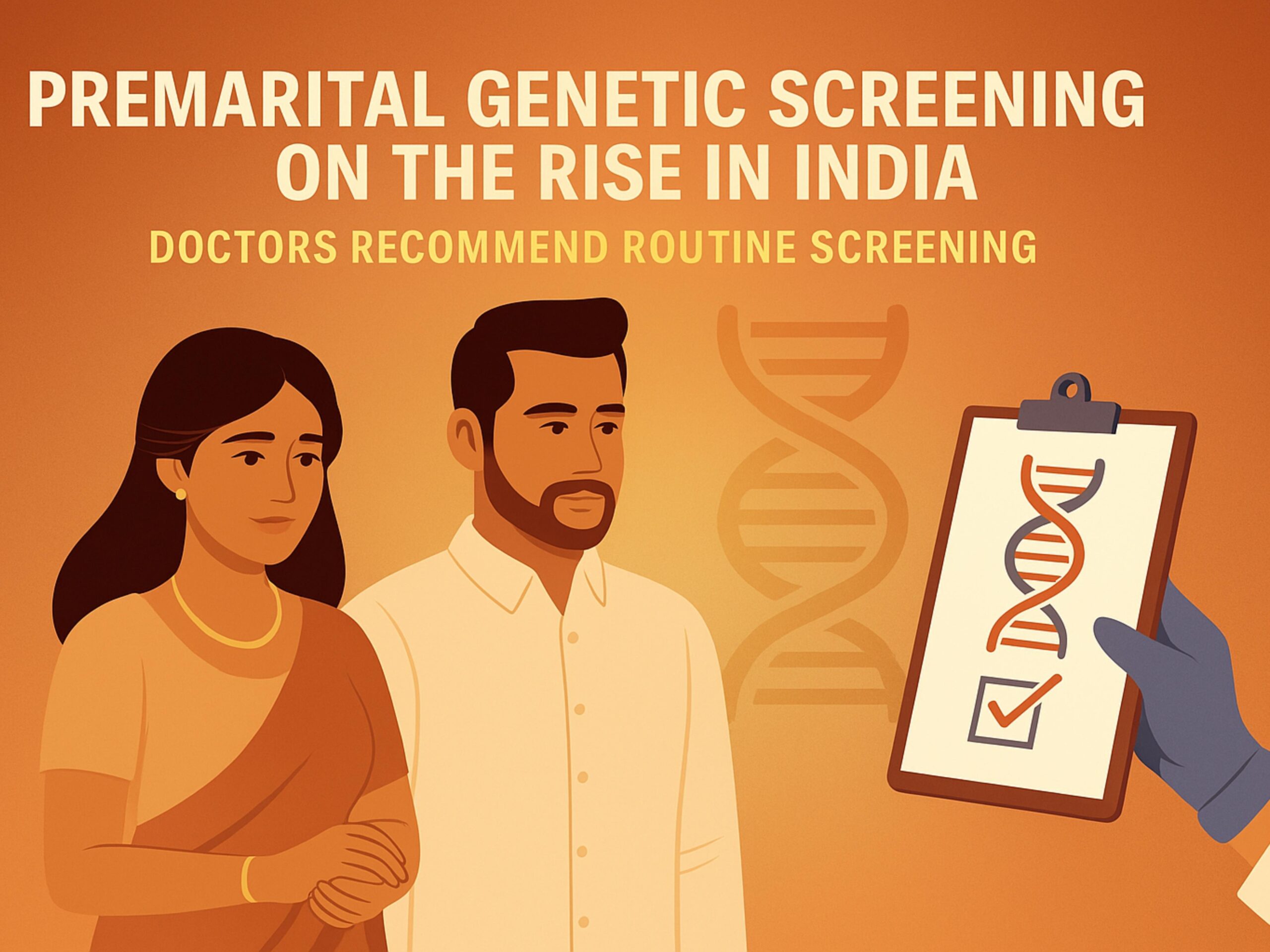Premarital Genetic Screening on the Rise in India – Doctors Recommend Routine Screening
Today, couples want more than love — they want peace of mind before they start life together.
One thoughtful way to get that peace is by taking a premarital genetic test.
It’s not only about health; it’s about awareness, care, and shared responsibility.
Premarital genetic testing helps you find out if either partner carries genes that could affect your future children.
In India, where family and culture guide many decisions, this test gives couples confidence to plan responsibly — balancing tradition with science.
This guide walks you step by step through how to get tested, what to expect, and how to discuss it with your partner and family.
-
What Is a Premarital Genetic Test?
A genetic test studies your DNA for small changes called mutations that may cause inherited disorders.
Many couples choose this test before marriage to check for conditions like Thalassemia, Sickle Cell Anaemia, or Cystic Fibrosis.
The goal isn’t to judge compatibility.
It’s to create awareness and prevent avoidable conditions.
Knowing early lets you plan ahead, take medical advice, and protect your future family’s health.
-
When Should You Take the Test?
The best time is when your relationship becomes serious or during the engagement phase — before marriage is finalized.
Testing early gives you time to review results calmly and discuss any next steps.
In arranged marriages, families often do it after engagement but before wedding rituals.
There’s no strict rule.
What matters most is openness, timing, and honest communication.
-
Step-by-Step Guide to Getting Tested in India
Step 1: Choose a Reliable Testing Centre
Select a NABL- or ICMR-accredited lab or a hospital with a genetics department.
Many city hospitals and trusted labs now offer premarital health packages that include genetic screening.
If you’re busy, opt for a verified service with home sample collection.
Step 2: Book an Appointment
Book online or by phone.
Fill in a short form with your age, family history, and contact details.
Some providers offer pre-test counselling — take it if available.
Step 3: Attend Pre-Test Counselling
A counsellor or doctor explains what’s being tested and what “carrier status” means.
Ask about privacy, result timelines, and how reports are shared.
This helps both partners feel comfortable and informed.
Step 4: Give Your Sample
The test uses a blood or saliva sample.
For home collection, a technician visits you — it takes 5–10 minutes and needs no fasting.
Step 5: Wait for the Results
Most labs deliver reports within 5–10 working days.
You’ll get a private digital report showing if either partner carries any genetic variant.
Step 6: Review the Results Together
Discuss your results with a certified genetic counsellor or doctor.
They’ll explain what each finding means and guide you on next steps.
If both partners carry the same gene (for example, Thalassemia Minor), the counsellor may suggest options like prenatal testing or IVF with genetic screening.
Step 7: Keep Talking
Once you know the results, talk openly and with care.
Genetic testing is about empowerment, not judgment.
Use what you learn to make health, family, and lifestyle decisions together.
-
Cost and Availability in India
Premarital genetic tests usually cost ₹5,000–₹25,000, depending on the test panel and the lab.
Major cities like Delhi, Mumbai, Hyderabad, and Bengaluru offer advanced facilities and home collection.
A digital health startup now deliver kits and reports within 48 hours — even in smaller towns.
-
Talking to Your Partner and Family
Discussing this test can feel delicate, especially with parents or elders.
They may not know much about it or may think it’s unnecessary.
Handle the conversation with calm and clarity.
Explain that the goal is health awareness, not suspicion.
Emphasize that both partners are tested equally.
Show that early knowledge helps protect future generations.
Today, many families see such steps as signs of maturity and care.
-
Legal and Ethical Points
In India, premarital genetic testing is voluntary, not mandatory.
Labs must get your informed consent before testing and must keep reports confidential.
Always read consent forms carefully and ask how your data will be stored and protected.
-
Real-Life Example
Ritika and Nikhil, an engaged couple from Pune, chose to take a genetic test before their wedding.
They learned that both were carriers of Thalassemia Minor.
With their counsellor’s help, they understood their options and realized they could still have healthy children.
Instead of fear, the test gave them trust and clarity.
Their families appreciated their thoughtful decision.
-
Build a Healthy Foundation for Marriage
A strong marriage stands on trust, honesty, and shared understanding.
A premarital genetic test adds health awareness to that foundation.
It’s not a medical formality — it’s a caring step for your shared future.
Whether your marriage is arranged or love-based, taking this test shows respect, maturity, and foresight.
Frequently Asked Questions
-
Is testing mandatory?
No. It’s voluntary, but doctors often recommend it for prevention.
-
Does it hurt or need fasting?
No. It’s a simple blood or saliva test — no fasting needed.
-
How long do results take?
Most labs deliver reports in 5–10 working days.
-
What if both partners are carriers?
Genetic counselling will guide you on safe medical and planning options.
